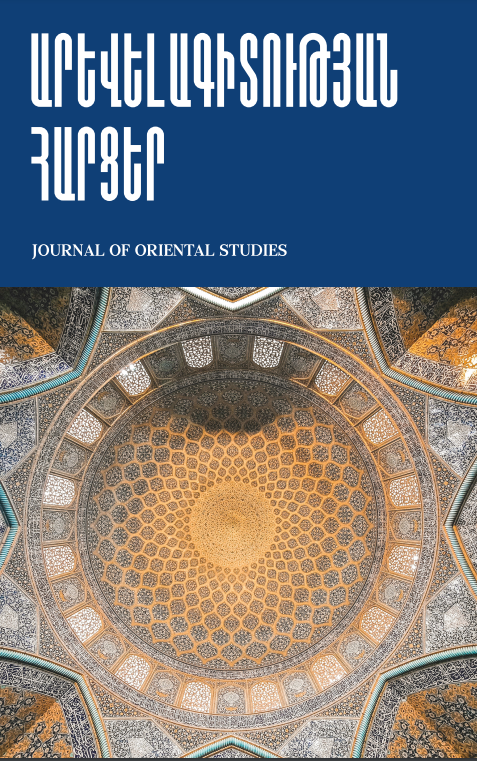MANIFESTATIONS OF PUBLIC DIPLOMACY AND SOFT POWER IN ARMENIAN-TURKISH RELATIONS
DOI:
https://doi.org/10.46991/jos.2024.25.1.216Keywords:
Armenia, Türkiye, Public Diplomacy, Soft Power, DiasporaAbstract
Even in the absence of diplomatic relations, the Republic of Armenia and the Republic of Turkey had several attempts at diplomatic contact. Along with official and institutionalized contacts between the two countries in multidisciplinary format, the toolkit of Public Diplomacy and Soft Power was applied as well. Moreover, these tools were used by various actors interested in the process of normalization of the Turkish and Armenian-Turkish relations. Apart from the scope of contacts with the Republic of Armenia, the Turkish side used Public Diplomacy and Soft Power in relations towards the Armenian diaspora, trying to soften the attitude of the* Armenians living in different countries towards (towards չեմ հասկանում ինչ ա նշանակում) Turkey and Turkish nation.
References
Gorenc N., Public Diplomacy as an Instrument of Us Foreign and Security Policy, Teorija in Praksa, no. 56(3), 2019, pp. 911–929.
Szostek J., What Happens to Public Diplomacy During Information War? Critical Reflections on the Conceptual Framing of International Communication”, International Journal of Communication, no. 14, 2020, pp. 2728–2748.
Davidson W. D., Montville J. V., Foreign Policy According to Freud, Foreign Policy, no. 45, 1981-1982, pp. 145–157.
Homans Ch., Track II Diplomacy: A Short History, Foreign Policy, https://foreignpolicy.com/2011/06/20/track-ii-diplomacy-a-short-history/ (accessed 19.09.2023).
Jones P., The Future of Track Two Diplomacy, Global Brief, https://globalbrief.ca/2015/10/the-future-of-track-two-diplomacy/ (accessed 19.09.2023).
The Applicability of the United Nations Convention on the Prevention and Punishment of the Crime of Genocide to Events which Occurred during the Early Twentieth Century”, The International Center for Transitional Justice, 2002,https://www.ictj.org/sites/default/files/ICTJ-Turkey-Armenian-Reconciliation-2002-English.pdf (accessed 19.09.2023).
Mandacı N., Reconciliation under the Shadow of Diaspora Politics: Some Lessons from the Turkish-Armenian Reconciliation Commission (TARC). Dokuz Eylül Üniversitesi Sosyal Bilimler Enstitüsü Dergisi, N 16(2), 2014, pp. 235–257.
Ter-Matevosyan V., Track Two Diplomacy between Armenia and Turkey:Achievements and Limitations”. Caucasus Analytical Digest, N 86, 2016, pp. 3-6.
Ministry Spokesperson Comments on the Reopening of AkhtamarChurch, MFA of Armenia, https://www.mfa.am/en/press-releases/2007/03/28/-akhtamar/120 (accessed 19.09 2023).
Directorate of Communications holds panel on «The Events of 1915» in New York, Directorate of Cummunications. https://www.iletisim.gov.tr/english/haberler/detay/directorate-of-communications-holds-panel-on-the-events-of-1915-in-new-york (accessed 19.09 2023):
Պողոսյան Ն., Կարապողոսյան Ս., Թուրքիայի Հանրապետության եւ թուրքական սփյուռքի համագործակցության հակահայկական ուղղվածությունը, Երեւան, 2016:
«30 տարի է` Հայաստանը միայնության մեջ է. Նոյան Սոյաք», Ալիք մեդիա, https://www.aliqmedia.am/2022/06/29/70560/ (accessed 19.09.2023):
Laçiner S., Ermeni Sorunu, Diaspora ve Turk Dis Politikasi, Ankara, Uluslararası Stratejik Araştırmalar Kurumu, 2008.
Şahin O., Akboğa S., Türkiye'de Devlet-Sivil Toplum Kuruluşları İlişkisi ve Sivil Toplum Kuruluşlarına Katılım. Uluslararası Siyaset Bilimi ve Kentsel Araştırmalar Dergisi, N 7(2), 2019, pp. 405-427.
Kesgin S., Türkiye-Ermenistan İlişkilerinin Realist Diş Politika Bağlaminda İncelenmesi. İktisadi ve İdari Bilimler Dergisi, Yıl, 3(6), 2017, pp.185-188.
Çavuşoğlu’nun Bozkurt İşaretinin Yankıları Sürüyor, VOA Türkçe, https://www.voaturkce.com/a/cavusoglu-nun-bozkurt-isaretinin-yankilari-suruyor/6544136.html?fbclid=IwAR3vSp1GZOnw2tMwyZjwteZJ_j7UHOaJZFOPhwT46HS1nQdVze7r08Q7dzI (accessed 19.09 2023).
Downloads
Published
Issue
Section
License
Copyright (c) 2024 Hayk Darbinyan

This work is licensed under a Creative Commons Attribution-NonCommercial 4.0 International License.
Authors will be entitled in ownership of the copyright for their publications.
Permitted third party reuse is defined by the following user license:
Creative Commons Attribution-Non-Commercial (CC BY-NC). CC BY-NC allows users to
copy and distribute the article, provided this is not done for commercial purposes. The users may
adapt – remix, transform, and build upon the material giving appropriate credit, providing a link
to the license. The full details of the license are available
at https://creativecommons.org/licenses/by-nc/4.0/.
Under this license, authors retain ownership of the copyright for their publications, but
grant Journal of Օriental Studies and Yerevan State University
Publishing house a non-exclusive license to publish the work in paper and electronic form and
allow anyone to reuse, distribute and reproduce the content as long as the original work is
properly cited. Appropriate attribution can be provided by simply citing the original work. No
permission is required from the authors or the publishers.

